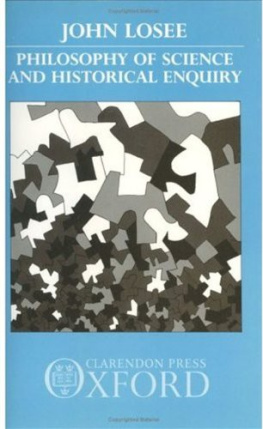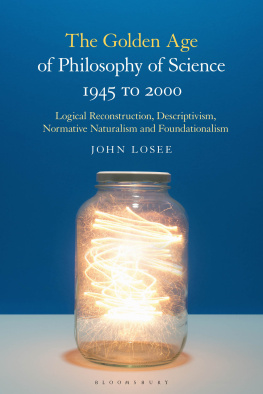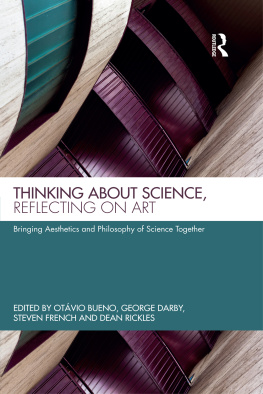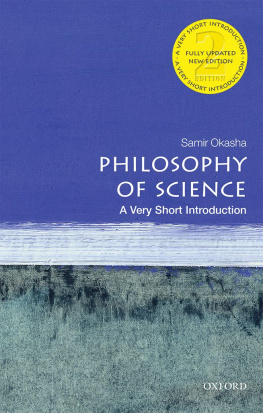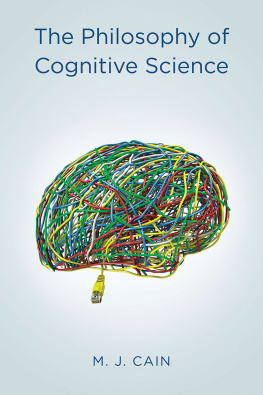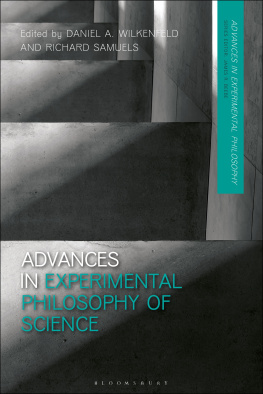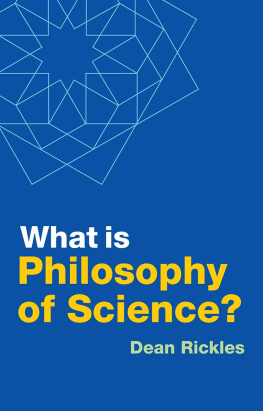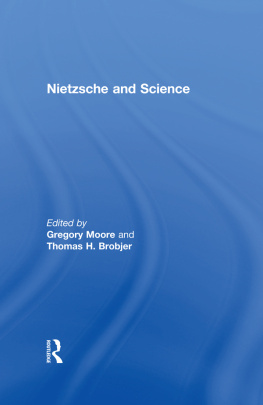Philosophy of Science and Historical Enquiry
JOHN LOSEE
CLARENDON PRESS OXFORD 1987
-iii-
Oxford University Press, Walton Street, Oxford OX2 6DP
Oxford New York Toronto Delhi Bombay Calcutta Madras Karachi Petaling Jaya Singapore Hong Kong Tokyo Nairobi Dar es Salaam Cape Town Melbourne Auckland and associated companies in Beirut Berlin Ibadan Nicosia
Oxford is a trade mark of Oxford University Press
Published in the United States by Oxford University Press, New York
John Losee 1987
All rights reserved. No part of this publication may be reproduced, stored in a retrieval system, or transmitted, in any form or by any means, electronic, mechanical, photocopying, recording, or otherwise, without the prior permission of Oxford University Press
British Library Cataloguing in Publication Data
Losee, John
Philosophy of science and historical enquiry.
1. Science--Philosophy
I. Title
501 Q175
ISBN 0-19-824946-2
Library of Congress Cataloging-in-Publication Data
Losee John.
Philosophy of science and historical enquiry.
Includes indexes.
1. Science--Philosophy. 2. Science--History.
I. Title.
Q175.L664 1987 501 86-23550
ISBN 0-19-824946-2
Printed and bound in Great Britain by Billing & Sons Limited, Worcester.
-iv-
Preface
HISTORIANS of science regularly judge whether particular decisions of scientists conform to the evaluative standards of the time. Philosophers of science may render such judgements as well. However, many philosophers of science also accept a prescriptive role for their discipline. They are not content merely to collect cases in which scientific practice does, or does not, conform to selected standards. Rather they seek to formulate and recommend criteria that ought to govern evaluative practice. Among these criteria are criteria to gauge the evidential support provided for hypotheses by observation reports, criteria to rank competing theories, and criteria to assess the cogency of diverse types of explanation. Philosophers of science may disagree about the content of proper evaluative practice, but an underlying assumption of prescriptive philosophy of science is that conformity to evaluative standards is a necessary condition for the creation of 'good science'. Prescriptive philosophy of science thus sanctions a distinction between correct and incorrect evaluative practice. To work within its tradition is to accept the possibility of adverse judgements about present evaluative practice in science.
It is a task for the historian of science to record the evaluative standards that are explicit or implicit within scientific practice in diverse contexts. The historian of science may also seek to catalogue cases in which scientific practice does or does not conform to accepted standards. From the standpoint of prescriptive philosophy of science, success in this enterprise is at best a preparatory stage for what is really important, namely the formulation of standards, application of which constitutes good evaluative practice in science. The appropriateness of this view of the relationship between philosophy of science and history of science is the principal concern of this book.
-v-
Acknowledgements
Some of the material on the views of Whewell and Mill, Shapere, and Toulmin has previously appeared in print. I am grateful to the editors of Studies in History and Philosophy of Science for permission to reproduce in Chapters 6 and 7 material from 'Whewell and Mill on the Relation Between Philosophy of Science and History of Science', 14 ( 1983), -26, and 'Limitations of an Evolutionist Philosophy of Science', 8 ( 1977), -52. I am grateful as well to the editors of The British Journal for the Philosophy of Science for permission to reproduce in Chapter 5 material from 'Shapere's Project for a Nonpresuppositionist Philosophy of Science', 37 ( 1986), -9. I am indebted to Mrs. Hilda Cooper for invaluable assistance in the preparation of the manuscript.
-vi-
Contents
| List of Tables |
| List of Figures |
| 1 Philosophy of Science and History of Science: The Principal Alternatives |
2 Are Philosophy of Science and History of Science Mutually Exclusive Disciplines? | I Kuhn's Gestalt Analogy | | II Philosophy of Science, History of Science, and Bohr's Principle of Complementarity | | III Kuhn's 'Puzzle-Solving' Model of Historical Explanation |
|
3 More Than a Marriage of Convenience I Confirmation and Historical Enquiry | Hempel's 'Satisfaction Criterion' of qualitative confirmation | | 'Historical' views of confirmation |
| II Theory Appraisal and Historical Enquiry | Herschel on 'undesigned scope' | | Reduction and history of science | | Theory replacement and the Correspondence Principle |
|
|
4 Prescriptive Philosophy of Science: A Historical Survey | I Aristotle | | II Newton | | III Nineteenth-Century Methodologists: Herschel, Whewell, and Mill | | IV Campbell | | V Operationalism | | VI The Programme of the Vienna Circle |
|
-vii-
| VII Margenau's 'Constructionist' Philosophy of Science | | VIII Popper |
|
5 Prescriptive Philosophy of Science and Inviolable Principles | I Changing Evaluative Standards and the Continuity of a Philosophy of Science | | II Shapere's Programme for a Non-presuppositionist Philosophy of Science |
|
6 The Justificatory Hierarchy I Evaluative Standards | Criteria of acceptability | | The ideal of deductive explanation |
| II Justification of Evaluative Standards | Whewell and the Historicist standpoint | | Mill and the Logicist standpoint | | Lakatos on the evaluation of historiographical research programmes | | Prospects for a moderate historicism |
| III Evaluation Procedures for the Justification of Evaluative Standards | Laudan's evaluation procedure | | Other Level 3 evaluation procedures |
| | IV Justification of Evaluation Procedures for the Selection of a Philosophy of Science |
|
7 Philosophy of Science Without Prescriptive Intent | I The Descriptive Alternative | II Anticipations of Descriptive Philosophy of Science | Hanson on the uses of scientific laws | | Toulmin on Ideals of Natural Order | | Feyerabend on methodological anarchism | | Shapere on the development of scientific domains | | Laudan's Reticulational Model of Justification |
|
|
| 8 Holton on Thematic Analysis |
| 9 History of Science and Descriptive Philosophy of Science |
| Index of Proper Names |
| Index of Subjects |
-viii-

